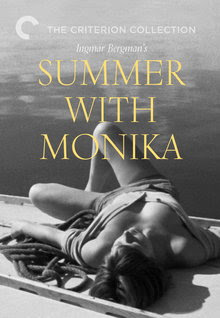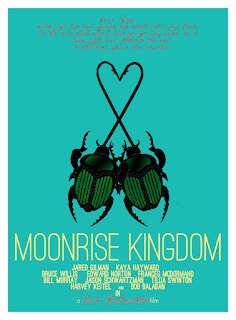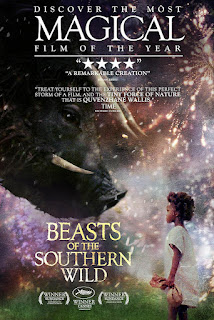First off – a disclaimer: there are still a few big films
that I have yet to see this year. I still haven’t finished watching Ben Affleck’s
“Argo”. And I haven’t had a chance to see Ang Lee’s “Life of Pi” or Katherine
Bigelow’s “Zero Dark Thirty” yet. They probably all could have sprinkled
somewhere in my list but seeing as how I don’t do top ten list and just
seemingly pick a random number of films to talk about, who knows where they
would end up and I wouldn’t remove anything that’s on this list… I don’t go to
the cinema very often so I’m always a little late to this party but this year I
was able to see a lot more of what peaked my interest because of Netflix and
other various forms of VOD. So, I came up with 14….. Sounded like a good idea
at the time.. Well, here you are. Two weeks after the Oscars and I'm finally posting it... Let's just call this one the final word.
14 - Moonrise Kingdom
Directed by Wes Anderson
This is the most Wes Andersony film that Wes Anderson (or
anyone else for that matter) has ever made. It’s so full of the very typical
minutia we cinefiles have come to expect and love or hate over the years. Of course,
if you’re not a fan of his previous work, my God you will probably despise this
film. I don’t think this is his best film, just the one most obviously created
by him.
13 – Cosmopolis
Directed by David Cronenberg
I’m not going to pretend I understood all of the themes
going on this film. There are times it had me pretty lost. But there is beauty
in its complexity and the chords it struck with me peaked my fascination as
much as any of Cronenberg’s best films. This one deals with a search for personal
identity (big surprise) in an increasingly chaotic world. It also speaks to the
very nature of commerce and the principals of anarcho-capitalism in a global
market. It reminded me of episode 31 of the 2nd season of ‘DuckTales’
in which Scrooge McDuck unwittingly destroys the morale of a peaceful village
by flooding them with bottle caps that they use a currency…. But then again,
most of the films I saw this year remind me of some episode of ‘DuckTales’….
12 - Beasts of the Southern Wild
Directed by Behn Zeitlin
This is a very sweet and touching film about community told
from the perspective of an adorable six year old girl name Hushpuppy.
Quvenzhane Wallis’ super realistic portrayal blends perfectly with the fantastical
elements of her imagination. He tells a relatively simple story about a very
interesting portion of the country, one far off the grid in which government
workers in helicopter appear to be aliens from another planet. This film is
comparable in that sense to 2010’s “Winter’s Bone” and cinefiles should be
eagerly awaiting what comes next from both the director and the star.
11 - Cabin in the Woods
Directed by Drew Goddard
This is a great example of deconstructionist horror. I think
it’s important to note that this movie is actually deconstructing a very
specific type of horror and all of the tropes that it relies on. I've heard a
few complaints about how weak this film’s horror story aspect is but I don’t
think it would have worked as well if it had been a “good” horror flick.
Ultimately, this film doesn't quite work as well as Scott Glosserman’s 2006
film “Behind the Mask” or Eli Craig’s “Tucker & Dale Vs Evil” but it threw
its hat into the mix and achieved what it was attempting.
10 - The Master
Directed by Paul Thomas Anderson
So you want to make a film that seriously conflicts and
confuses the Academy?.. It’s simple really. Just make a great movie with
amazing performances, fantastic cinematography and score. Write a brilliant
screenplay and then use it to poke fun at Scientology. You should get several
nominations and zero wins. I’m kidding a little. I saw this film really early
and I honestly had no idea that it had anything to do with Scientology while I was
watching it. It wasn't until a few weeks later that I heard some stuff coming
out that it could be a topic of controversy… I also passionately don’t care one
way or the other. I just saw a very well made film about male relationships,
self-loath and control. Joaquin Phoenix gave what I thought was hands down the
best performance of his career and of the year for that matter. Phillip Seymour
Hoffman and Amy Adams were also great.
9 - The Imposter
Directed by Bart Layton
Lying is part of human nature. This is self evident. We come
to lie from a host of different paths but they all stem from the same reason. We
don’t want the truth… says Captain Obvious. Luckily this film digs into
something even deeper than our very natural tendency to tell a lie. It takes a
look at our similarly natural need to believe one. This is my favorite
documentary this year. I've said before that the types of docs I prefer are
just like this one. They tell a very specific story that you would have
otherwise been unexposed to and are relatable because of the universal truths
they explore.
8 - Holy Motors
Directed by Leos Carax
Leos Carax’ latest film is an episodic storytelling of the
past present and undeniable future of cinema. Denis Lavant brilliantly portrays
11 different characters as he travels via limousine through Paris, fulfilling each
one of his appointments as a different character. This is one of those films
that I really loved but I’m not too sure who I could recommend it to. Not to
sound too much like a condescending snob but, if you don’t spend a significant
portion of your life watching, discussing and studying cinema, there’s just a
lot of stuff in here that you’re not going to get.
7 - The Avengers
Directed by Joss Whedon
I don’t think I had more fun with a film this year. I was
really setting myself up for a disappointment with this one too. The origin
stories leading up to this one have been a pretty mixed bag so I really wasn't sure what to expect when the big one hit. I feel like I should have just
trusted director Joss Whedon to deliver what he always brings, a fun,
intelligent action film with an ensemble list of characters. It took a little
while to get going but all is forgiven once the action starts to fly. This blu-ray
will surely be one that gets plenty of use.
6 - Django Unchained
Directed by Quentin Tarantino
Any new film by Quentin Tarantino that is not at the very
top of my list is kind of a disappointment to me, especially after 2009’s “Inglourious
Basterds”. I really tried to watch this one without those types of expectations
but Tarantino’s films simply don’t just exist in a bottle. He has spent the
past two decades creating his own cinematic world that each one of his films
play a specific roll in. That being said, this is a pretty great addition to
that world. It was thoroughly enjoyable and featured a standout performance by
Leonardo DiCaprio as Calvin Candie. This film is not without its missteps
though. I found some of the comedic moments to be a bit ham-fisted and
Tarantino should really stop casting himself in rolls. His acting usually leans
on the distractingly bad side.
5 - The Raid: Redemption
Directed by Gareth Evans
This is the year I learned what Silat is. It is a form of
martial arts practiced in Indonesia and Malaysia. I've always liked martial arts flicks but I think
it would be pretty rare for me to include them in a top ten list. This film starts
out fast and never lets up throughout. It’s great to see a director of a
fighting film put so much effort not only in the choreography of the fighters
but of the camera as well. If you’re on the fence about seeing this one, I would
highly suggest you check out Gareth Evans previous film, “Merantau” on Netflix.
It features some of the same actors and great stunts and choreography.
4 - Amour
Directed by Michael Haneke
Amour is a great title to Michael Haneke’s latest film. This
film is an uneasy, sometimes downright disturbing portrait of a very long
lasting love and the grief associated with it. This is not a flick for the weak
of heart because the characters involved are not as such. This is also why
Haneke was the perfect filmmaker for it. His fans (myself included) have come
to expect his unflinching and often punishing technique. He does a great job at
showing the true nature of an impatiently patient and imperfectly perfect love.
3 - Lincoln
Directed by Steven Spielberg
I would say that this is Spielberg’s best film since 2005’s “Munich”.
It’s a captivating and in depth procedural about one of the most crucial times
in our nation’s history. Daniel Day Lewis is amazing and supported by a
fantastic cast. And cinematographer Janusz Kaminski uses his incredible control
of light, shadows and color to create a beautiful and picturesque portrait of a
debate that is still relevant today. I also appreciated that the story’s focus
was on the events that took place in Washington and it left out all of the
stuff about zombies and vampires.
2 - Compliance
Directed by Craig Zobal
Whether or not a film is based on a true story has almost
never informed my opinion one way or the other as to how good of a film it is. This
is an exception. If this had been just some story that someone had made up, it
would not have been a story worth telling. It’s just too unbelievable… But
alas, this actually happened. I actually remember the news story about this and
although I can’t attest to how accurate the film is to real events, this thing
has actually happened. That fact alone means that it is a story that should be
told. I would suggest that you watch this film as though it is a low budget
horror and the titular character is the great evil lurking in the dark.
1 - Cloud Atlas
Directed by Andy Wachowski, Lana Wachowski and Tom Tykwer

This film
got probably the most mixed review of the year. Rolling Stones added to their worst
of 2012 list and Time Magazine named it the worst film of the year. Fortunately
for me, my opinion of the film is the only one that matters to me in my own
head and I loved this one. This film features six different timelines, all
interwoven with multiple impacts on each other and one single strand of truth. Everything
that anyone and everyone has ever done or been has an effect on everything that
anyone and everyone is and ever will be. No man is an island despite all of our
best efforts. I am a little disappointed in the fact that most references that I've heard of this film mention the Wachowski siblings and rarely Tom Tykwer. Fans
of Tykwer’s previous work like “Run Lola Run”, “Heaven” and “Perfume: The Story
of a Murderer” have come to expect greatness from him and I feel his influence
delivered a great film…. Whereas, the last great film the Wachowskies have
given us was “The Matrix”, 14 years ago.... but I digress. This film is exactly what I want cinema to be. It's big, bold, beautiful and completely audacious.

















+05.jpg)


.jpg)
































